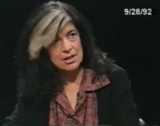
and Against Interpretation
.
Sontag, born Susan Rosenblatt, was born in New York City
to Jack Rosenblatt and Mildred Jacobsen, both Jewish. Her father managed a fur trading business in China, where he died of tuberculosis
when Susan was five years old. Seven years later, her mother married Nathan Sontag.
The need for truth is not constant; no more than is the need for repose. An idea which is a distortion may have a greater intellectual thrust than the truth; it may better serve the needs of the spirit, which vary. The truth is balance, but the opposite of truth, which is unbalance, may not be a lie.![]()
The truth is always something that is told, not something that is known. If there were no speaking or writing, there would be no truth about anything. There would only be what is.![]()
Illness is the night-side of life, a more onerous citizenship. Everyone who is born holds dual citizenship, in the kingdom of the well and in the kingdom of the sick. Although we all prefer to use only the good passport, sooner or later each of us is obliged, at least for a spell, to identify ourselves as citizens of that other place.![]()

